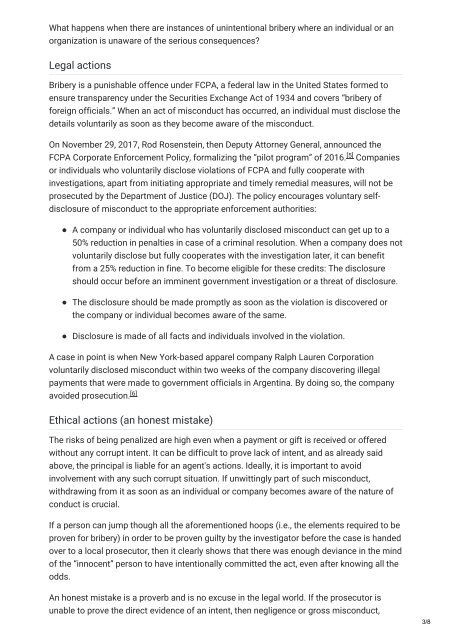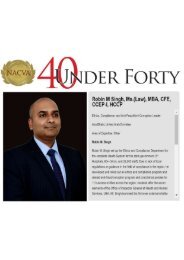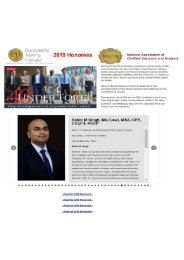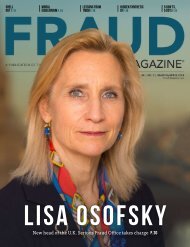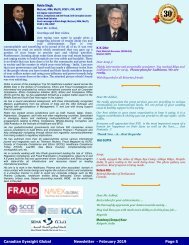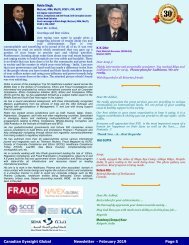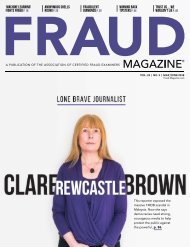complianceuniverse.org-An Unintentional Act of Bribery
You also want an ePaper? Increase the reach of your titles
YUMPU automatically turns print PDFs into web optimized ePapers that Google loves.
What happens when there are instances <strong>of</strong> unintentional bribery where an individual or an<br />
<strong>org</strong>anization is unaware <strong>of</strong> the serious consequences?<br />
Legal actions<br />
<strong>Bribery</strong> is a punishable <strong>of</strong>fence under FCPA, a federal law in the United States formed to<br />
ensure transparency under the Securities Exchange <strong>Act</strong> <strong>of</strong> 1934 and covers “bribery <strong>of</strong><br />
foreign <strong>of</strong>ficials.” When an act <strong>of</strong> misconduct has occurred, an individual must disclose the<br />
details voluntarily as soon as they become aware <strong>of</strong> the misconduct.<br />
On November 29, 2017, Rod Rosenstein, then Deputy Attorney General, announced the<br />
FCPA Corporate Enforcement Policy, formalizing the “pilot program” <strong>of</strong> 2016. Companies<br />
or individuals who voluntarily disclose violations <strong>of</strong> FCPA and fully cooperate with<br />
investigations, apart from initiating appropriate and timely remedial measures, will not be<br />
prosecuted by the Department <strong>of</strong> Justice (DOJ). The policy encourages voluntary selfdisclosure<br />
<strong>of</strong> misconduct to the appropriate enforcement authorities:<br />
A company or individual who has voluntarily disclosed misconduct can get up to a<br />
50% reduction in penalties in case <strong>of</strong> a criminal resolution. When a company does not<br />
voluntarily disclose but fully cooperates with the investigation later, it can benefit<br />
from a 25% reduction in fine. To become eligible for these credits: The disclosure<br />
should occur before an imminent government investigation or a threat <strong>of</strong> disclosure.<br />
The disclosure should be made promptly as soon as the violation is discovered or<br />
the company or individual becomes aware <strong>of</strong> the same.<br />
Disclosure is made <strong>of</strong> all facts and individuals involved in the violation.<br />
A case in point is when New York-based apparel company Ralph Lauren Corporation<br />
voluntarily disclosed misconduct within two weeks <strong>of</strong> the company discovering illegal<br />
payments that were made to government <strong>of</strong>ficials in Argentina. By doing so, the company<br />
avoided prosecution.<br />
[6]<br />
[5]<br />
Ethical actions (an honest mistake)<br />
The risks <strong>of</strong> being penalized are high even when a payment or gift is received or <strong>of</strong>fered<br />
without any corrupt intent. It can be difficult to prove lack <strong>of</strong> intent, and as already said<br />
above, the principal is liable for an agent's actions. Ideally, it is important to avoid<br />
involvement with any such corrupt situation. If unwittingly part <strong>of</strong> such misconduct,<br />
withdrawing from it as soon as an individual or company becomes aware <strong>of</strong> the nature <strong>of</strong><br />
conduct is crucial.<br />
If a person can jump though all the aforementioned hoops (i.e., the elements required to be<br />
proven for bribery) in order to be proven guilty by the investigator before the case is handed<br />
over to a local prosecutor, then it clearly shows that there was enough deviance in the mind<br />
<strong>of</strong> the “innocent” person to have intentionally committed the act, even after knowing all the<br />
odds.<br />
<strong>An</strong> honest mistake is a proverb and is no excuse in the legal world. If the prosecutor is<br />
unable to prove the direct evidence <strong>of</strong> an intent, then negligence or gross misconduct,<br />
3/8


